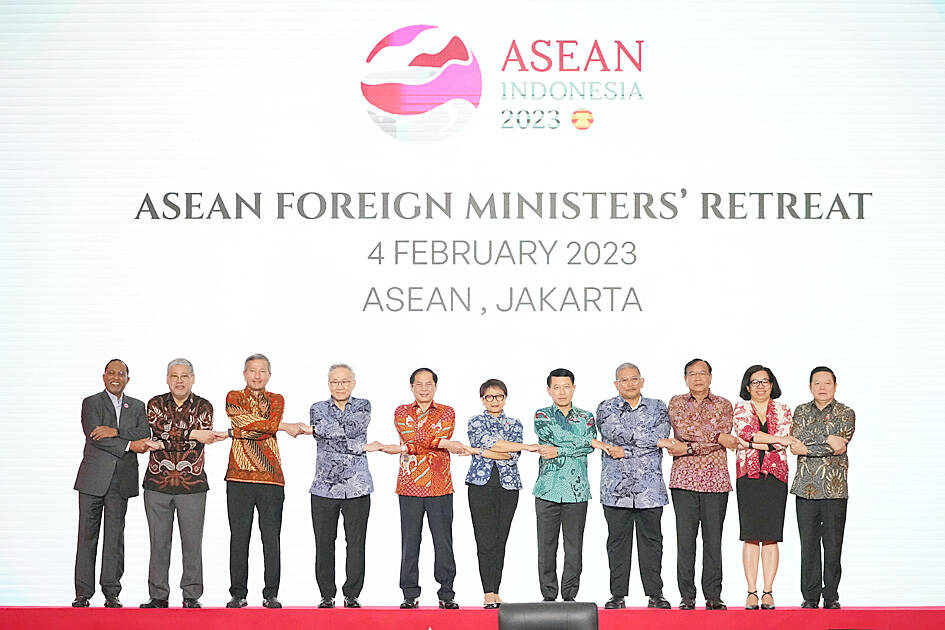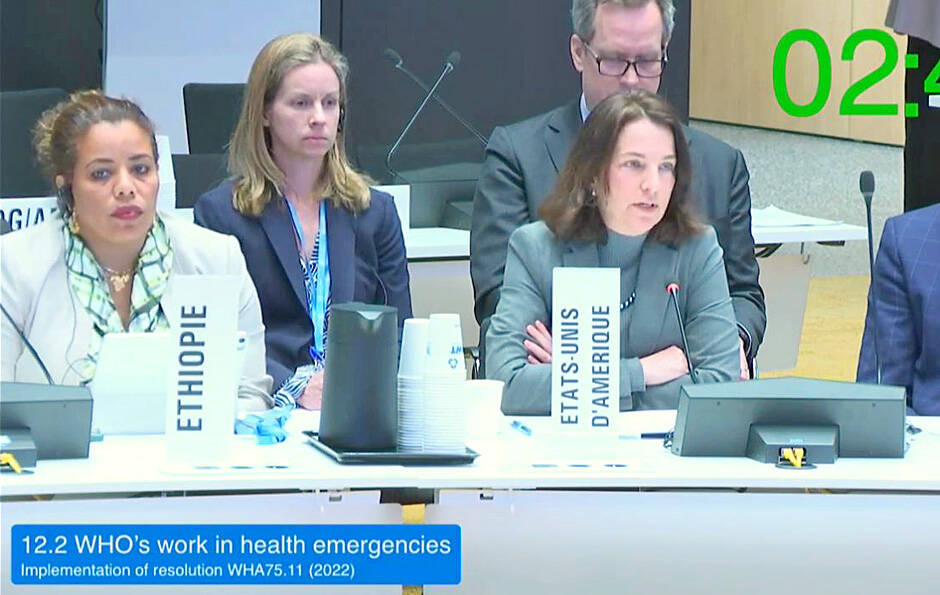The Ministry of Foreign Affairs yesterday welcomed a joint statement by ASEAN leaders voicing concerns that the situation across the Taiwan Strait could affect regional stability.
The statement was issued after the ASEAN Foreign Ministers’ Retreat ended on Saturday in Jakarta. It was the first major meeting since Indonesia assumed chairmanship of ASEAN this year.
Attendees of the meeting reiterated their determination to promote “sustainable peace, security, stability, and prosperity within and beyond the region,” the statement said.

Photo: AP
They expressed concerns about developments across the Taiwan Strait and their “implications on regional stability,” the statement said.
The cross-strait situation “could lead to miscalculation, serious confrontation, open conflicts, and unpredictable consequences,” it said.
ASEAN is ready to “play a constructive role in facilitating peaceful dialogue between all parties ... to de-escalate tension, to safeguard peace, security and development in the area adjacent to our region,” it said.

Photo: Screen grab from the WHO’s Web site
The group voiced similar concerns after the ASEAN Foreign Ministerial Meetings in August last year, the ministry said in a news release yesterday.
That meeting was held as the Chinese military was conducting live-fire drills around Taiwan after then-US House of Representatives speaker Nancy Pelosi visited Taipei.
At the time, ASEAN called for “maximum restraint, refrain from provocative action.”
The ministry called on ASEAN member states to continue to support democratic Taiwan and pay attention to cross-strait peace and stability.
Taiwan is willing to deepen cooperation with ASEAN based on the solid foundation of the New Southbound Policy to protect the rules-based international order and facilitate peace, stability and prosperity in the Indo-Pacific region, it said.
Taiwan hopes that the summits and meetings held under the leadership of Indonesia are successful, it added.
In other news, Japan, Nauru and the US have voiced support for Taiwan at the 152nd session of the WHO Executive Board, which began on Monday last week and ends tomorrow.
“We urge WHO to be fully inclusive of all partners, including Taiwan, and support Taiwan’s participation as an observer to the WHA [World Health Organization] and in the work of WHO,” Bathsheba Nell Crocker, US ambassador to the UN in Geneva, Switzerland, said on Saturday.
Japanese Assistant Minister for Global Health and Welfare Eiji Hinoshita praised Taiwan’s success in tackling COVID-19, calling on the WHO not to “make any geographical vacuums which are created by leaving specific regions behind in addressing global health issues.”
Nauru said in a statement that omitting countries such as Taiwan from WHO projects “creates a gap that undermines global preparedness and response to health emergencies.”

CHAOS: Iranians took to the streets playing celebratory music after reports of Khamenei’s death on Saturday, while mourners also gathered in Tehran yesterday Iranian Supreme Leader Ayatollah Ali Khamenei was killed in a major attack on Iran launched by Israel and the US, throwing the future of the Islamic republic into doubt and raising the risk of regional instability. Iranian state television and the state-run IRNA news agency announced the 86-year-old’s death early yesterday. US President Donald Trump said it gave Iranians their “greatest chance” to “take back” their country. The announcements came after a joint US and Israeli aerial bombardment that targeted Iranian military and governmental sites. Trump said the “heavy and pinpoint bombing” would continue through the week or as long

TRUST: The KMT said it respected the US’ timing and considerations, and hoped it would continue to honor its commitments to helping Taiwan bolster its defenses and deterrence US President Donald Trump is delaying a multibillion-dollar arms sale to Taiwan to ensure his visit to Beijing is successful, a New York Times report said. The weapons sales package has stalled in the US Department of State, the report said, citing US officials it did not identify. The White House has told agencies not to push forward ahead of Trump’s meeting with Chinese President Xi Jinping (習近平), it said. The two last month held a phone call to discuss trade and geopolitical flashpoints ahead of the summit. Xi raised the Taiwan issue and urged the US to handle arms sales to

BIG SPENDERS: Foreign investors bought the most Taiwan equities since 2005, signaling confidence that an AI boom would continue to benefit chipmakers Taiwan Semiconductor Manufacturing Co’s (TSMC, 台積電) market capitalization swelled to US$2 trillion for the first time following a 4.25 percent rally in its American depositary receipts (ADR) overnight, putting the world’s biggest contract chipmaker sixth on the list of the world’s biggest companies by market capitalization, just behind Amazon.com Inc. The site CompaniesMarketcap.com ranked TSMC ahead of Saudi Aramco and Meta Platforms Inc. The Taiwanese company’s ADRs on Tuesday surged to US$385.75 on the New York Stock Exchange, as strong demand for artificial intelligence (AI) applications led to chip supply constraints and boost revenue growth to record-breaking levels. Each TSMC ADR represents

State-run CPC Corp, Taiwan (CPC, 台灣中油) yesterday said that it had confirmed on Saturday night with its liquefied natural gas (LNG) and crude oil suppliers that shipments are proceeding as scheduled and that domestic supplies remain unaffected. The CPC yesterday announced the gasoline and diesel prices will rise by NT$0.2 and NT$0.4 per liter, respectively, starting Monday, citing Middle East tensions and blizzards in the eastern United States. CPC also iterated it has been reducing the proportion of crude oil imports from the Middle East and diversifying its supply sources in the past few years in response to geopolitical risks, expanding